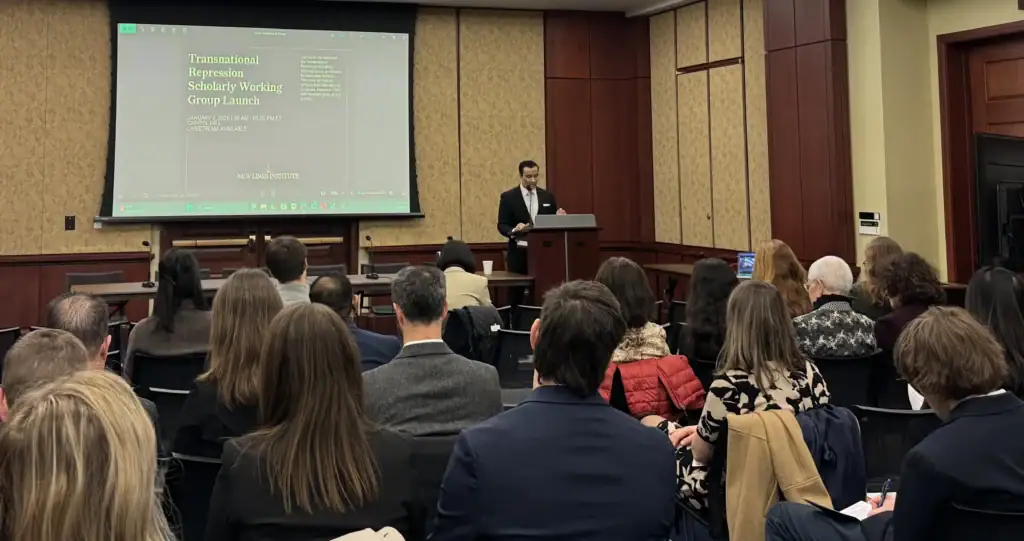
Israeli Plans to Annex the West Bank
The election of Israel’s new government, led once again by Prime Minister Benjamin Netanyahu, marks a turning point in Israel’s history as well as American efforts to manage the Israeli-Palestinian conflict.
The path to Israel’s annexation of a significant portion of the West Bank – the latest chapter in the century-long Zionist effort to build Jewish sovereignty in Palestine – is now open. More than at any time since Israel gained control over the West Bank and Gaza in June 1967, the environment – domestically, regionally, and internationally – offers Israel an unprecedented opportunity to take this step. Sometime after July 1, Israel can be expected to extend Israeli law and jurisdiction to close to 30 percent of the West Bank, which risks upending the uneasy calm that has existed in the Palestinian territory for almost a decade and a half.

In contrast to all its predecessors, the administration of U.S. President Donald Trump has been active in fostering elements in Israel who have long sought this objective. The administration has contributed to the destruction of an international consensus supporting both Israeli security and Palestinian sovereignty west of the Jordan River, a win-win outcome best suited to protect essential Israeli and Palestinian national interests.
The three Israeli elections in the past 18 months have been absolutely conclusive in regard to the central issue at the heart of the ongoing conflict between Israel and the Arabs: The new Israeli government reflects, for the first time in Israel’s history, the consolidation of a national coalition in favor of annexing significant parts of the West Bank.
According to government guidelines, from July 1, 2020, the Knesset is expected to vote on annexing parts of the West Bank based on the Trump administration’s support for the annexation plans. Such a vote is to be held “as quickly as possible.”
“It’s time to apply the Israeli law and write another glorious chapter in the history of Zionism,” declared Netanyahu at the Knesset inauguration on May 17.
Annexation and the International Environment
The Trump administration has been forthright in acknowledging that U.S. policy must reflect the settlement “facts on the ground” established by Israel over the last half-century. Indeed, at its heart, the Trump “Deal of the Century” vindicates the long-practiced Israeli view that the Palestinians and their international allies would be compelled to recognize the settlement as ground realities – including upwards of 700,000 settlers – established by Israel in the occupied territories.
Annexation is not an entirely new feature of Israeli occupation. Within days of Israel’s victory in the 1967 war, the Knesset voted overwhelmingly to authorize the government to extend Israeli jurisdiction and public administration over the Palestinian territories it seized during the Six-Day conflict. Israel immediately applied its self-delegated authority over East Jerusalem, sparking international opposition. Similar international opposition was mustered when Israel unilaterally extended its jurisdiction over the occupied Syrian Golan Heights in 1981.
As Israel considers its annexation options, the international environment has never appeared more accommodating. Five decades of international diplomacy has failed to establish an agreed mechanism for Israel’s retreat to the “secure and recognized borders” agreed upon by the U.N. Security Council in Resolutions 242 and 338. This framework has now been turned on its head: The central feature of the diplomatic scene today is not how much Israel will surrender to an ersatz Palestinian state but how much of the West Bank it will unilaterally take for itself.
In contrast to past administrations, Washington appears eager to encourage and recognize an Israeli annexation decision. Its ambassador in Jerusalem, David Friedman, has been a consistent and forceful advocate of policies aimed at repudiating principles at the heart of longstanding U.S. policy on Jerusalem, the Golan Heights and, most recently, on the West Bank. He notes that the prospects for Palestinian sovereignty will only be contemplated when the Palestinians become “Canadians” (Ambassador Friedman’s analogy is a creative way of saying that the Palestinians must accept Israel’s domination of the area as a pre-condition for statehood).
Former Vice-President Joe Biden, the presumptive Democratic Party presidential candidate, has noted that he will not reverse Trump’s decision to locate the U.S. embassy in Jerusalem. If Biden is not prepared to contest Israel’s policy of imposing a fait accompli in league with the Trump administration, Netanyahu can only be encouraged to take advantage of this unique opportunity for Israel – and Netanyahu himself – to make history before U.S. elections in November.
Indeed, the unprecedented U.S. support for annexation all but forces Israel to act. Should Netanyahu decide to forgo Washington’s invitation, questions – and hopes – among many would necessarily be raised about Israel’s staying power in the West Bank. For Israel, this would be an untenable consequence of Trump’s offer.
Virtually every other actor on the regional and international stage rejects the prospect of annexation, but they have never been less capable of compelling Israel (or Washington) to accommodate their views. Egypt and Jordan each have longstanding peace agreements with Israel that were facilitated by the hope of an eventual Israeli retreat on the West Bank. Both have registered opposition to annexation, and Jordan’s King Abdullah has warned of a “massive conflict” if Israel proceeds but is not in any position to exert pressure.
Elements from within Israel’s security establishment have voiced concerns that existing relations with its treaty partners Egypt, Jordan, and the Palestine Liberation Organization (PLO) will be compromised by an Israeli decision to annex. But these views show no sign of being decisive factors when placed in the balance against the opportunity to formally declare Jewish sovereignty in Israel’s biblical heartland.
Jordan and Egypt are indeed impediments to an Israeli decision to annex, but Israel has never let their concerns dictate its actions – on Jerusalem, for example, or on the Gaza Strip, where Israel’s actions over the past two decades have been strongly opposed by Egypt. The same holds true for the red flags raised by international organizations and the broader global community.
Israel has been taking decisions opposed by the PLO and Palestinians for a century. This decision will be no different: There is no sign that Israel will shape its policies to accommodate Palestinian demands. Indeed, the entire thrust of Israeli policy over these many decades has been to ensure Israel limits Palestinian sovereignty west of the Jordan River.
Potential Constraints on Annexation
U.S. support for annexation of almost one-third of the West Bank is indeed an historic opportunity, but the policy environment in Washington under the Trump administration is anything but consistent. The Netanyahu government must be wary of becoming intoxicated by the current views in Washington.
Annexation might well undermine the process of incremental or “creeping” annexation that defines Israel’s occupation policies and plunge the West Bank, Gaza, and Israel into a far-ranging international and security crisis. Additionally, a decision to annex may be tempered by considerations of the probable negative effects of such a move on relations with Jordan and Egypt (even though neither Amman nor Cairo are in a position to force Israel to reconsider). The considerable progress attained on developing security and trade relations in the Gulf is also a potentially limiting factor.
The international community, including important trading partners in Europe and elsewhere, might rouse itself to sanction Israel on the Crimea model.
Any decision on annexation must also consider the possibility that the Palestinian National Authority and its security arms will not survive such a decision. Indeed, three decades after the Oslo process commenced, annexation is a signal that Israel is prepared for a new post-Oslo model of Palestinian governance in the West Bank.
Annexation Options
Areas A and B comprise 41 percent of the West Bank. Netanyahu has no intention to modify their current status – nominally ruled by the Palestinian National Authority on civil and criminal matters and subject to Israeli security controls.
Area C – under direct Israeli security and civil control – comprises 59 percent of the West Bank. As Israel contemplates a decision on annexation, a menu of options is on offer – ranging from the territorial status quo to the annexation of parts of Area C as proposed by the United States.
Those who argue that as a consequence of annexation and the collapse of the option for Palestinian sovereignty, Israel will condemn itself to extending the franchise to West Bank Palestinians in a “one-state solution” have not learned the lesson of half a century of occupation, an era marked by a dynamic succession of Israeli innovations that successfully segregated and marginalized Palestinians even as settlements and settlers flourished.
Annexation does not necessarily preclude the option of an eventual negotiated Israeli withdrawal. The extension of Israeli law and jurisdiction to Jerusalem and Golan did not prevent Israel from engaging in negotiations with the PLO and Syria respectively on Israeli withdrawal. During negotiations on the Golan in the 1990s, for example, Israel’s negotiator denied that Israeli moves constituted annexation at all. Indeed, Israel has never formally claimed sovereignty over the Golan Heights to this day.
As Netanyahu contemplates his move on annexation, the internal constraints on a policy of annexation – those centered around the concerns of Israel’s security establishment on the ramifications of annexation on the security partnership with the PLO in the West Bank and Hamas in Gaza – are the most significant. The views of other actors – principally Egypt and Jordan – are less decisive.
An effective commitment of the international community to an Israeli retreat to secure and recognized boundaries and the concurrent establishment of a truly sovereign Palestinian state in the West Bank and Gaza with East Jerusalem as its capital would no doubt preclude Israel’s unilateral annexation. But diplomacy based on such parameters has been absent since 2014, and in any case, international support for such a policy has never been more than aspirational. In the current circumstances, when the momentum of diplomacy has shifted so clearly away from this objective, it is all but impossible to contemplate the effective pursuit of such a policy. Nevertheless, this formula remains the critical foundation for stabilizing the conflict between Israel and the Arabs and the one best suited to advance Israeli and Palestinian national aspirations alike.
The views expressed in this article are those of the author and not an official policy or position of the New Lines Institute.




